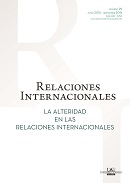The rejection of conflict in the Western normative horizon and the consequent construction of Bashar al-Assad as a foe
Keywords:
Foe, discursive construction , Bashar al-Assad , conflict , liberalismCopyright (c) 2015 Alice MARTINI, José Francisco ESTÉBANEZ

This work is licensed under a Creative Commons Attribution-NonCommercial-NoDerivatives 4.0 International License.
Abstract
The aim of the following article is to analyse the discursive construction of the Syrian President Bashar al-Assad made by the political leaders of the United States, France, and the United Kingdom, in the context of the two first years of the current Syrian civil war. Our argument contends that, through the words of these statesmen, Assad became a “foe” according to the concept adopted by Carl Schmitt. In our view, this construction is explained by the fact that certain Western countries move in a concrete and specific Western normative horizon, where we can find the liberal idea of “rejection of conflict”, being this reason —in addition to others— the one which helps us understand the whole process. For this reason, it will be essential to analyse the power of discourse in creating realities and to underline how much this has been useful in transforming Syrian President Assad in a foe, as it may be seen in our case study.





